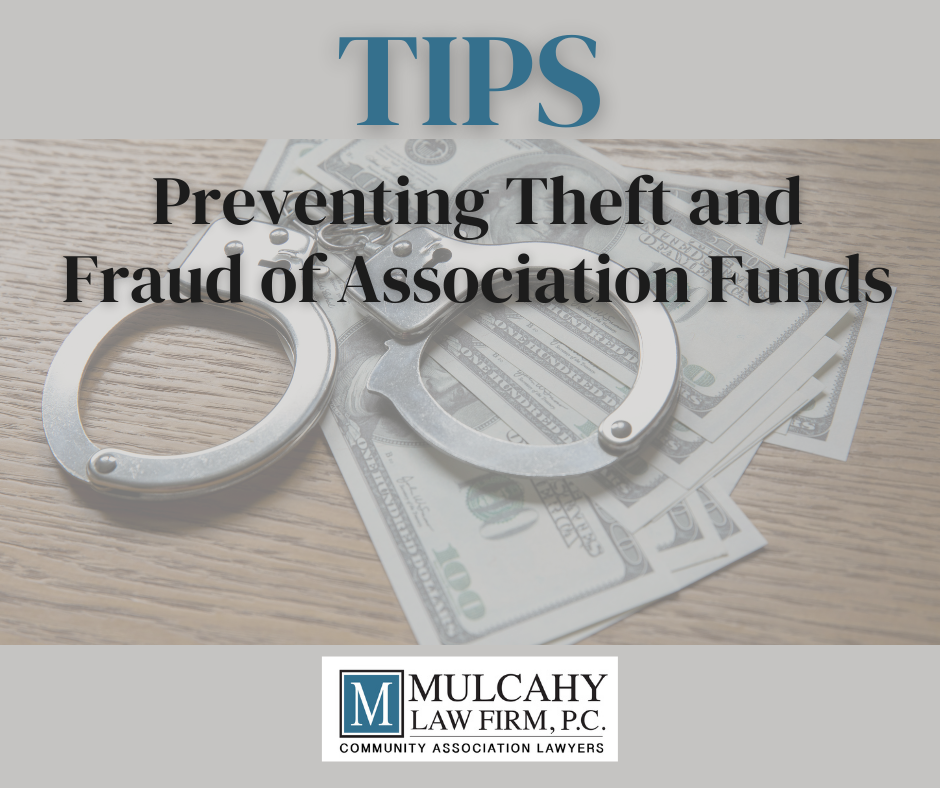I was recently asked the following question… The treasurer for our association is refusing to give other board members any of our association’s financial records, including bank statements. 3/5 of our board members worry that the treasurer may be embezzling the association’s money. What can we do as a board to get this situation under control?
One of a board of director’s primary responsibilities is to preserve and maintain the association’s assets. I agree, this doesn’t sound good and it is my opinion that the rest of your board needs to take swift action. First, all board members should have full access to all of the association’s books and records, including all financial records of the association. You should make one final attempt to see all the financial records and if the treasurer refuses, a majority of the board should reach out to your association’s legal counsel to get advice immediately. Some things that can possibly be done, depending on what your documents state, are to remove the treasurer as an officer, gain control of the association’s bank accounts and request records from the association’s bank.
Set forth below are some examples of misappropriation of funds in an HOA/condo board context: 1. outright taking of cash; 2. faked expenses; 3. non-existent employees or former employees included on the payroll; 4. transferring association funds to another community, the management company, or the manager; 5. use of association funds as collateral on personal loans; 6. showing investments on the financial statements as certificates of deposit when they are actually non-existent. 7. a manager paying personal bills with association funds.
And, here are warning signs of potential fraud in an HOA/condo board context: missing bank statements and reconciliations, general ledgers that do not balance, missing and altered documents, photocopies rather than originals, unexplained cash shortages, unauthorized credits to receivable accounts, increased past due accounts, duplicate payments to vendors, unexplained overdraft and other bank charges, unauthorized purchase transactions and payments for unspecified services.
Accounting checks and balances are vital steps toward protecting the association’s assets, but, vigilance and awareness are also needed. The board of directors should have access to and regularly review all financial books and records.
Associations should also carry employee dishonesty/crime (Fidelity Bond) insurance coverage in addition to any coverage the managing agent might carry. This policy should cover anyone who has access to the association’s funds. If fraud or embezzlement is discovered after obtaining access to the finances for your association, you and your attorney should discuss the possibility of making an insurance claim on the Association’s insurance policies.
Here are some quick tips for preventing theft and fraud of association funds.
Our law firm suggests that boards have the following accounting and financial controls in place to prevent embezzlement and fraud in their association:
1. Keep association records up to date (don’t fall behind on financial statements, budgets);
2. Assign control of all reserve funds to the entire board (not one person);
3. Monthly financial reports should be prepared and made available for board review (include in the monthly report: a balance sheet, a statement of revenues and expenses and a comparison of actual revenues and expenditures to budgeted amounts);
4. Require two signatures (including at least one board member) on all checks or transfers greater than a pre-designated amount;
5. Prior to signing checks, authorized check signers must review invoices and supporting documentation;
6. Review bank statements and reconciliations on a monthly basis;
7. Keep only a small amount of petty cash on hand and in a secure place and have a procedure for keeping track of petty cash;
8. Regularly review delinquent receivable balances;
9. Purchase adequate fidelity insurance to cover the volunteers and employees who handle funds. In addition, arrange for directors and officers coverage (D&O insurance) in the event the board is accused of financial mismanagement;
10. Hire a CPA to conduct an independent annual review or audit; and
11. If your board discovers that funds are missing from your association, remove the suspected fraud perpetrator from a position of control, put a stop on all bank account activity, notify your insurance carrier and check with your association attorney for advice on how to proceed.
Please contact Beth Mulcahy, Esq. at bmulcahy@mulcahylawfirm.com if you have questions or need advice on this matter or any other legal matter pertaining to HOAs and/or condominiums.

